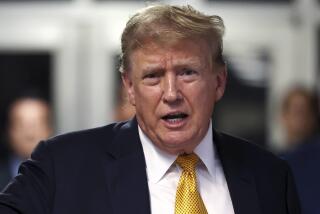White House Releases Broad Challenge to Allegations
- Share via
WASHINGTON — The White House on Tuesday released its most comprehensive challenge to the central elements of the articles of impeachment that the House Judiciary Committee will consider this week.
In the 184-page document, President Clinton’s White House lawyers, his private attorney and his special counsel for impeachment matters assembled and expanded on legal points that they have raised since independent counsel Kenneth W. Starr issued his report on the Monica S. Lewinsky scandal in September.
The document provides a point-by-point attack on all facets of the case against President Clinton, focusing on the three grounds that the panel will consider for an impeachment resolution.
Following are key arguments raised in the president’s defense:
On Perjury
* In his deposition in the Paula Corbin Jones sexual harassment case, President Clinton did not perjure himself in denying a “sexual affair” or “sexual relationship” with Lewinsky because he believed those terms implied having sexual intercourse with her, rather than oral sex.
* The president did not deny in the deposition ever being alone with Lewinsky, but only said he did not “recall” being alone with her.
* Clinton’s denial in grand jury testimony of having a sexual relationship with Lewinsky was not perjury because he admitted having “inappropriate intimate contact” with her.
* Clinton’s and Lewinsky’s recollections of the kinds of sexual contact they had do not always agree but that does not prove Clinton’s versions are lies and hers are true. (This relates to fondling that Lewinsky has described but Clinton has not acknowledged.)
Obstruction of Justice
* Clinton did not try to conceal gifts he gave Lewinsky that would be evidence of their relationship. The president’s lawyers cited grand jury testimony by Clinton’s secretary, Betty Currie, and by Lewinsky that Clinton did not try to hide the gifts. Starr has alleged that Clinton was involved in hiding the gifts.
* Clinton did not help Lewinsky find a job specifically to obtain favorable testimony from her in the Jones case. Clinton’s assistance was minimal, and presidential friend Vernon E. Jordan Jr. helped Lewinsky on Currie’s request.
* Clinton did not make an agreement with Lewinsky to lie under oath about their relationship. And Lewinsky’s “so-called cover stories,” which she and the president concocted to hide their relationship--for instance, that she was visiting the Oval Office to see Currie or give Clinton papers--”were literally true.”
On Abuse of Power
* Clinton was obliged as president to assert executive privilege in seeking to protect the confidentiality of his consultations with lawyers and senior staff members about the Lewinsky affair.
* Clinton never invoked the privilege to prevent his staff members from providing the investigating grand jury with the facts of his relationship with Lewinsky or to delay the investigation.
* Even as she ruled against the president’s claims of privilege, U.S. District Court Judge Norma Holloway Johnson never found Clinton’s assertion to be “groundless, improper, made in bad faith or in any way an ‘abuse of power.’ ”
* Presidents do not legally abuse their power when they tell an untruth publicly. President Reagan and Vice President Bush were accused of making false statements in the Iran-Contra affair. Presidents Kennedy and Johnson told untruths about the Bay of Pigs incident and the Vietnam War, the White House said.
“If false public statements are to satisfy the constitutional standard for impeachment, it is difficult to conceive of a single presidency in the last century that would not have been subject to potential impeachment proceedings,” the lawyers wrote.
More to Read
Get the L.A. Times Politics newsletter
Deeply reported insights into legislation, politics and policy from Sacramento, Washington and beyond. In your inbox twice per week.
You may occasionally receive promotional content from the Los Angeles Times.










